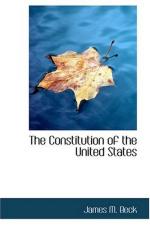In his speech on Conciliation with America of March 22, 1775, Edmund Burke showed his characteristically philosophic comprehension of this powerful constitutional conscience of the then American subjects of the Empire. After stating that in no other country in the world was law so generally studied, and referring to the fact that as many copies of Blackstone’s Commentaries had been sold in America as in England, he added:
“This study renders men acute, inquisitive, dexterous, prompt in attack, ready in defence, full of resources. In other countries the people, more simple and of a less mercurial cast, judge of an ill principle in government only by an actual grievance; here they anticipate the evil, and judge of the pressure of the grievance by the badness of the principle.”
Moreover, these hardy pioneers were the privileged heirs of the great political traditions of England. While the Constitution of the United States was very much more than an adaptation of the British Constitution, yet its underlying spirit was that of the English speaking race and the Common Law. Behind the framers of the Constitution, as they entered upon their momentous task, were the mighty shades of Simon de Montfort, Coke, Sandys, Bacon, Eliot, Hampden, Lilburne, Milton, Shaftesbury and Locke. Could there be a better illustration of Sir Frederick Pollock’s noble tribute to the genius of the common law:
“Remember that Our Lady, the Common Law, is not a task-mistress, but a bountiful sovereign, whose service is freedom. The destinies of the English-speaking world are bound up with her fortunes and migrations and its conquests are justified by her works”?
Another reason makes the consideration of the subject not only interesting but opportune. “These are the times that try men’s souls.” It is a time of sifting, when men of all nations in civilization in these critical days are again testing the value even of those political institutions which have the sanction of the past. Society is in a state of flux. Everywhere the foundations of governmental structures seem to be settling—let us hope and pray upon a surer foundation—and when the seismic convulsion of the world war is taken into account, it is not surprising that this is so. While the storm is not yet past and the waves have not wholly subsided, it is natural that everywhere thoughtful men as true mariners are taking their reckonings to know where they are and whether the frail bark of human institutions is still sufficiently seaworthy to keep afloat.




